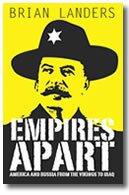Empires Apart: America and Russia from the Vikings to Iraq by Brian Landers
 Some blogs are streams of consciousness ramblings that meander from subject to apparently unrelated subject. I feel like doing something like that today because three different ideas have been buzzing around my mind as possible blog topics: the Plantagenets, Gordon Brown and breakfast cereals. Not subjects with any obvious link. But bear with me.
Some blogs are streams of consciousness ramblings that meander from subject to apparently unrelated subject. I feel like doing something like that today because three different ideas have been buzzing around my mind as possible blog topics: the Plantagenets, Gordon Brown and breakfast cereals. Not subjects with any obvious link. But bear with me.
The history of the Plantagenets which my predecessor on this blog, Guy Fraser-Sampson, is writing is exactly the sort of book I like reading. He is chronicling one of the most exciting periods in English history. In concluding his blog he compared the Plantagenet Empire to the American and Russian Empires I am writing about. The Plantagenet Empire, he said, was “Much sin but no spin, did not pretend its missiles were good for you and, of course, lasted longer”. The first two points are brilliant, but “lasted longer”? That perhaps is yet to be proved.
Alexander Solzhenitsyn described as a “naive fable” the absurd sound-bite I mentioned yesterday from Francis Fukuyama that the fall of the Iron Curtain marked “the end of history”. Solzhenitsyn was being uncharacteristically generous. The end of the Cold War may have seen the dismemberment of most of the Soviet Empire but it did nothing to dent the imperial intent which has been a feature of Russian history since Ivan the Terrible if not before. Now that intent is obvious again in the Caucuses and the rest of the world needs to decide how to respond.
Gordon Brown is quite clear. Writing in last Sunday’s Observer he points out that Russia can’t be allowed to get away with invading sovereign nations, picking and choosing which international rules to follow and acting unilaterally. The answer to all this awful stuff, he writes, is to “strengthen the transatlantic alliance”. That is we need an alliance with a United States government that invades sovereign nations, picks and chooses which international rules to follow and acts unilaterally.
The hypocrisy would be sickening were it not that Brown is not being hypocritical, he really believes that the United States is not what it is. His is a classic example of cognitive dissonance. When facts come up that don’t fit his ideological preconceptions his mind alters the facts not the preconceptions.
I quote in Empires Apart as pure an example of cognitive dissonance as it is possible to get. In his 2004 re-election campaign President Bush proclaimed the moral superiority of free nations like the United States “Free nations are peaceful nations”, he insisted. “Free nations don’t attack each other. Free nations don’t develop weapons of mass destruction.” Coming from the leader of a nation that had just invaded Afghanistan and Iraq and whose armouries included more than half of the entire world’s stock of weapons of mass destruction these words surely exceed any absurdity Gordon Brown might utter.
But their absurdity seems to escape not just Bush and Brown, (and to complete the roll call of B-list politicians, Blair) but most of our other opinion-leaders.
Why do we so easily see actions as evil when the perpetrators are Russian but not when the same things are done by America? That’s a question it would take far more than a blog to answer; I’m not sure Empires Apart fully answers it. But part of the answer may be that we are totally enmeshed by America’s commercial empire and its values. It is simply taken for granted that Americans are the goodies.
American corporations now seem to be a natural part of all our lives. I would argue that increasingly it is accepted that they and not the state should look after us and decide for us what is worthwhile and what is not. That may seem an extreme suggestion but let me quote an apparently innocent example.
My daughters are keen swimmers. They both recently moved up a level and received certificates and lovely cloth badges. The certificates and badges proclaim “National Swim Awards” (and isn’t “swim” rather than “swimming” an Americanism?). They also proclaim in flamboyant letters “Kellogg’s FROSTIES”. The swimming achievements of British children are being funded not by a levy on taxpayers organized by the British government but by a levy on buyers of breakfast cereals organized by a foreign corporation. (And Kellogg is a foreign corporation although I have noticed that it never uses in Britain the slogan I remember from my school days in Illinois “Kellog’s – the all-American breakfast”).
Of course it is rather a leap to suggest that an American corporation insidiously promoting its sugary pap to British school children somehow bears comparison with America invading Iraq or Russia invading Georgia, but sometimes random thoughts are not as unrelated as they seem.
When I was in primary school I remember playing a game in which we were given two or three unrelated words and then had to put them together in a single sentence. Usually the results were nonsensical but every so often somebody would produce something almost believable. Now I almost believe it really is possible to link the Plantagenets, Gordon Brown and breakfast cereals.